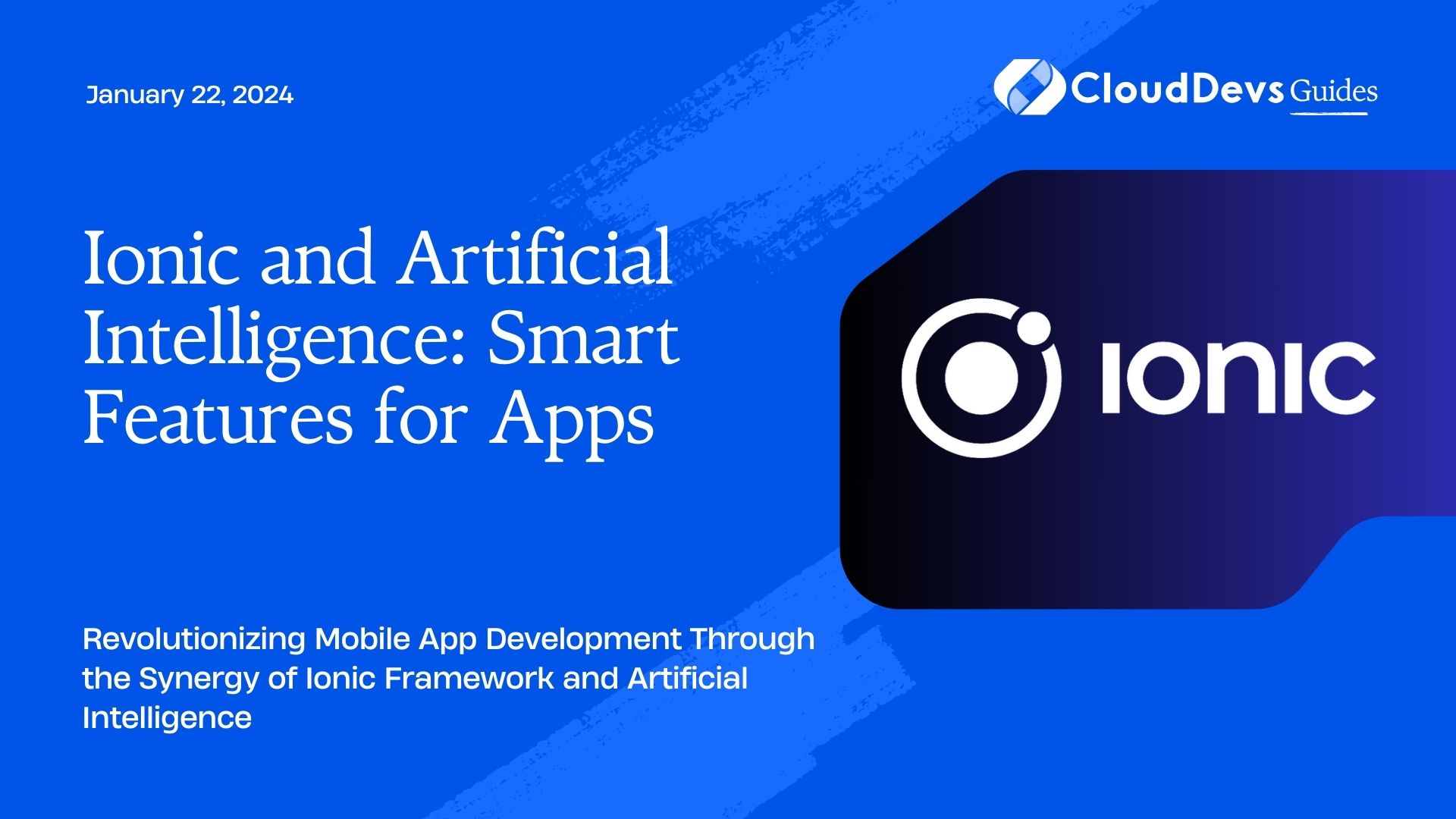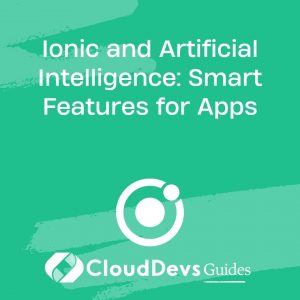Ionic and Artificial Intelligence: Smart Features for Apps
In the ever-evolving landscape of mobile app development, the integration of Artificial Intelligence (AI) has emerged as a game-changer. With AI, apps can become smarter, more intuitive, and capable of providing personalized experiences that cater to individual user needs. One of the popular frameworks for building cross-platform mobile apps, Ionic, has not lagged behind in harnessing the power of AI. In this blog, we’ll delve into the exciting world where Ionic meets Artificial Intelligence, exploring how you can create smart features for your apps.
Table of Contents
1. The Marriage of Ionic and AI
Before we delve into the technical details, let’s understand the synergy between Ionic and AI.
- Ionic: The Cross-Platform App Development Framework
Ionic is an open-source framework that allows developers to build high-quality, cross-platform mobile apps using web technologies like HTML, CSS, and JavaScript. It offers a robust ecosystem of pre-built UI components, a vibrant community, and tools for efficient development, making it a preferred choice for many developers.
- Artificial Intelligence: The Brains Behind Smart Apps
Artificial Intelligence encompasses a wide range of technologies that enable machines to mimic human intelligence, learn from data, and make informed decisions. Machine Learning (ML) and Deep Learning (DL) are subsets of AI that have particularly revolutionized app development.
When Ionic meets AI, it opens up exciting possibilities for creating apps that are not just functional but also intelligent and adaptive.
2. Smart Features Enabled by Ionic and AI
Now, let’s explore some of the smart features you can incorporate into your Ionic apps with the power of Artificial Intelligence.
2.1. Personalized Recommendations
One of the most compelling use cases of AI in apps is personalized recommendations. By analyzing user behavior, preferences, and historical data, you can recommend content, products, or services that are highly relevant to each user.
javascript // Sample JavaScript code for personalized recommendations const userPreferences = getUserPreferences(); const recommendedItems = AIRecommendationEngine.getRecommendations(userPreferences); displayRecommendedItems(recommendedItems);
2.2. Chatbots for Customer Support
Integrating AI-powered chatbots into your Ionic app can enhance user engagement and provide round-the-clock customer support. These chatbots can understand user queries and provide relevant responses.
javascript // Sample JavaScript code for integrating a chatbot const userQuery = getUserQuery(); const chatbotResponse = AIChatbot.getResponse(userQuery); displayChatbotResponse(chatbotResponse);
2.3. Voice Recognition and Natural Language Processing (NLP)
Voice recognition and NLP capabilities allow users to interact with your app using natural language. This is especially useful in apps like virtual assistants, language learning, and transcription services.
javascript // Sample JavaScript code for voice recognition const userVoiceInput = getUserVoiceInput(); const textOutput = AINLP.processVoiceInput(userVoiceInput); displayTextOutput(textOutput);
2.4. Image Recognition
Image recognition powered by AI can enable your app to identify objects, faces, and even emotions from images. This is valuable in applications such as social media, e-commerce, and health monitoring.
javascript // Sample JavaScript code for image recognition const userImage = getUserImage(); const imageAnalysis = AIImageRecognition.analyzeImage(userImage); displayImageAnalysis(imageAnalysis);
2.5. Predictive Analytics
AI-driven predictive analytics can help your app anticipate user needs. For example, in an e-commerce app, it can predict which products a user is likely to purchase next based on their previous behavior.
javascript // Sample JavaScript code for predictive analytics const userBehavior = getUserBehavior(); const nextRecommendedAction = AIPredictiveAnalytics.predictNextAction(userBehavior); displayNextRecommendedAction(nextRecommendedAction);
3. Implementing AI in Ionic Apps
Now that you’ve seen some of the exciting AI-powered features, let’s explore how to implement AI in your Ionic apps.
3.1. Selecting an AI Framework
Before you can integrate AI into your Ionic app, you need to choose the right AI framework or library. Popular choices include TensorFlow, PyTorch, and scikit-learn for machine learning, and libraries like Dialogflow for chatbots.
3.2. Data Collection and Training
AI algorithms require data for training. Depending on your use case, you’ll need to collect and preprocess data to train your AI models. This could involve user behavior data, text corpora, or image datasets.
3.3. Integration with Ionic
To integrate AI into your Ionic app, you’ll typically use JavaScript libraries or plugins that provide interfaces for AI functionality. For example, you can use TensorFlow.js for machine learning tasks.
3.4. Testing and Optimization
Once integrated, thoroughly test your AI-powered features to ensure they work as expected. Optimize your models for performance and efficiency, as AI can be resource-intensive.
3.5. User Privacy and Data Security
Remember to handle user data with care and ensure compliance with data privacy regulations. AI often involves collecting and processing user data, so prioritize user privacy and security.
4. Challenges and Considerations
While the fusion of Ionic and AI offers incredible possibilities, it also comes with its set of challenges and considerations.
4.1. Resource Constraints
Mobile devices may have limited processing power and memory. AI algorithms can be resource-intensive, so it’s crucial to optimize them for mobile environments.
4.2. Data Privacy
AI often involves collecting and analyzing user data. Ensure that you have robust data privacy measures in place and comply with relevant regulations like GDPR.
4.3. User Experience
While AI can enhance user experiences, it can also introduce complexity. Ensure that AI features are intuitive and user-friendly to avoid overwhelming users.
4.4. Maintenance and Updates
AI models require periodic updates to stay relevant and accurate. Plan for maintenance and updates to ensure long-term success.
5. Real-World Examples
To inspire you further, here are some real-world examples of apps that have successfully integrated Ionic with AI to deliver exceptional user experiences:
5.1. Netflix
Netflix uses AI-powered recommendation algorithms to suggest movies and TV shows to its users. This personalized approach keeps users engaged and encourages longer subscription periods.
5.2. Duolingo
Duolingo, a language-learning app, employs AI for speech recognition. It evaluates users’ pronunciation and provides instant feedback to help them improve their language skills.
5.3. Snapchat
Snapchat uses AI for its popular filters and lenses, which can recognize and augment faces in real time. This feature has contributed significantly to the app’s popularity.
5.4. Grammarly
Grammarly’s AI-driven writing assistant helps users improve their writing by providing suggestions for grammar, spelling, and style. It’s a powerful tool for professionals and students alike.
Conclusion
The convergence of Ionic and Artificial Intelligence has opened up a world of opportunities for creating smarter, more engaging, and user-centric mobile apps. Whether you’re building a social networking app, an e-commerce platform, or a language-learning tool, AI can add a layer of intelligence that sets your app apart.
As you embark on your journey to integrate AI into your Ionic apps, remember to stay updated with the latest advancements in AI and mobile app development. Experiment, iterate, and keep user experience at the forefront of your efforts. With the right blend of Ionic’s versatility and AI’s intelligence, your app can truly shine in today’s competitive market.
So, what’s your next AI-powered feature for your Ionic app? The possibilities are endless, and the future is bright for app developers willing to explore this dynamic fusion of technology.
Start your journey today and watch your Ionic app evolve into a smarter, more responsive, and user-friendly experience that keeps users coming back for more.
Table of Contents








